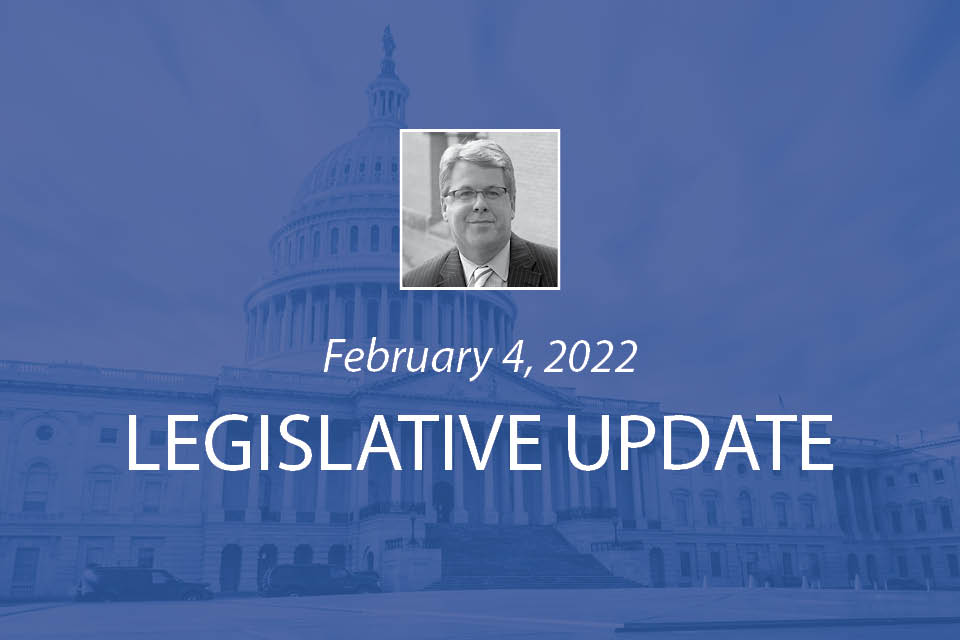Build Back Better
ABMA met this week with Senator Joe Manchin’s (D-WV) office to discuss the status of the House-passed Build Back Better legislation and our concerns with the tax provisions in the bill. The Senator’s staff confirmed that the legislation is dead in the Senate in its current form. We walked through ABMA’s concerns with the manner in which the legislation relies on tax revenue from small and medium sized businesses by increasing the tax rates on S-Corporations and other pass through tax structures. As you know, Senator Manchin has been the leading Democrat advocate in the Senate for slowing down consideration of this legislation and he and Senator Kyrsten Sinema (D-AZ) are the reason that the bill has not advanced in the upper chamber.
Senator Ron Wyden (D-OR) is expected to unveil a slimmed down version of the bill at some point in the near future that will be climate change focused. We are told that renewable energy tax incentives will be a centerpiece, as will provisions around prescription drugs. ABMA will continue to make the rounds with Senate Democrat offices to ensure that they understand the impact that these revenue raisers will have on Main Street businesses.
Supply Chain
The House of Representatives this week has been considering China competition legislation known as the America COMPETES Act, which includes a number of trade provisions and other items to enhance the United States’ competitive position as it relates to China. Yesterday, the House voted 367-59 in favor of an amendment to include the Ocean Shipping Reform Act (OSRA) of 2021 as a part of the America COMPETES Act.
OSRA provides a number of authorities to the Federal Maritime Commission to alleviate congestion at our nation’s ports and provides relief to shippers that have been subject to unfair fees and penalties from ocean freight carriers.
The House is expected to vote on final passage of America COMPETES today. Once this bill clears the House a conference committee process will ensue to iron out differences between this bill and the Senate-passed United States Innovation and Competition (USICA) Act.
On the trucking side, Representative Henry Cuellar (D-TX) introduced a bipartisan bill this week to help address supply chain shortages and increase the number of truck drivers transporting goods in the U.S. The Licensing Individual Commercial Exam-takers Now Safely and Efficiently (LICENSE) Act, would streamline burdensome licensing regulations by making permanent several waivers that the Federal Motor Carrier Safety Administration (FMCSA) implemented in response to the ongoing COVID-19 pandemic.
The bill would allow state and third-party examiners previously authorized to administer the commercial driver’s license (CDL) skills test to also administer the CDL knowledge test without having to complete the training course. This will help get additional drivers on the road faster without compromising safety.
It would also allow licensed drivers who are accompanying commercial learner’s permit (CLP) holders to move from the front seat of a truck cab to its sleeper berth. In many cases, CLP holders have already passed their road tests and are simply waiting to receive the physical copy of their commercial driver’s license, and this change would recognize that.
Finally, the bill would allow states to administer driving skills tests to applicants from other states. This will streamline the credentialing process and allow future truckers to get tested where they live rather than only where they received their training.
The bill is cosponsored by Reps. Darin LaHood (R-IL), Troy Balderson (R-OH), and Josh Harder (D-CA). In the Senate, Senators Cynthia Lummis (R-WY) and Mark Kelly (D-AZ) are co-leads.
Workforce Development
The America COMPETES Act also includes workforce development provisions that seek to provide employers a new pipeline of talent by creating nearly 1 million additional apprenticeship opportunities over the next 5 years. The bill incorporates the National Apprenticeship Act of 2022 which expands Registered Apprenticeships to provide workers with paid, on-the-job-training. Registered Apprenticeships have been shown to be the most successful approach to growing a highly skilled workforce for in-demand occupations.




